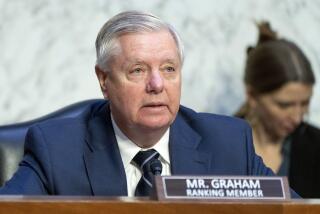Grand Jury in Keating Case Curbed Actions : Thrifts: They wanted to indict other American Continental and Lincoln S&L; figures but decided to focus on key players.
- Share via
The state grand jury that indicted Charles H. Keating Jr. and three others on securities fraud also considered charging several other employees of Lincoln Savings & Loan and its parent firm with wrongdoing, recently released grand jury transcripts reveal.
The panel also wanted to further investigate the role of state regulators in the sale of nearly $200 million in debt securities through Lincoln’s 29 Southern California branches, according to a member of the panel.
But in an effort to keep the complex case manageable, prosecutors advised the 22-member panel to limit the indictment to the top officials of Lincoln and Phoenix-based American Continental Corp.
“We want to go after the people truly responsible for this behavior in a way that promises some possibility of success in a time frame soon enough to be meaningful to the victims,” Los Angeles County Deputy Dist. Atty. Thomas Papageorge told the grand jurors.
The result was a 42-count indictment in mid-September for securities fraud against Keating, former American Continental President Judy J. Wischer and Robin S. Symes and Ray C. Fidel, both former presidents of Irvine-based Lincoln.
On Friday, Los Angeles Superior Court Judge Lance A. Ito set aside 22 counts of the indictment because many of the charges did not clearly state the alleged wrongdoing. The judge gave the prosecutors until Nov. 19 to rewrite the indictment.
The indictment charges the defendants with falsely stating and failing to state the true risks associated with the sale of American Continental debt securities to more than 17,000 investors. Those bonds became worthless after the company filed for bankruptcy protection in April, 1989, and regulators seized Lincoln the next day. Regulators estimate that Lincoln’s collapse will cost taxpayers more than $2 billion.
The grand jury transcripts, which were released Friday, give a picture of the prosecutor’s strategy. The state wanted to keep the indictment narrow in an effort to make it understandable to a trial court jury.
Toward that end, prosecutors decided to drop their original effort to seek charges of conspiracy and grand theft by false pretenses because the charges were too complex and difficult to prove, the grand jury transcripts showed.
Prosecutors came to the closing arguments before the grand jury on Sept. 11 with a proposed indictment in hand naming Keating and three others. They argued against expanding the case to include more defendants, or more charges.
One of the grand jurors, Glenn Buchanan of Sherman Oaks, confirmed in an interview Monday that the panel considered including several other Lincoln and American Continental officials in the indictment, but finally decided not to indict others.
Buchanan said grand jurors considered bringing charges against American Continental executives Robert J. Kielty, Andrew Ligget and Jack D. Atchison and Lincoln executive Dariush cq Razavi, a top aide to Fidel. None of the four men could be reached for comment.
While none of the people identified by Buchanan have been indicted, their names often appear in the 4,500 pages of grand jury testimony publicly released.
According to the transcript, Papageorge said, under a charge of grand theft by false pretenses, for instance, prosecutors would have to prove that the defendants had actual intent to defraud specific victims, Papageorge said.
“We would have to prove that Mr. Keating or Ms. Wischer or any of the other actors you might think, Mr. Liggett(sic), Dariush Razavi, Mr. Kielty, whoever might have entertained the specific statement of mind to defraud the individual victim,” he said.
Before joining American Continental at a salary of nearly $1 million, Atchison had been a partner at the accounting firm of Arthur Young & Co. in Phoenix and was head of the audit team that produced the last two American Continental financial statements.
Those statements, much criticized by thrift regulators, were largely what the state Department of Corporations relied on in approving the sale of American Continental bonds, even though the state agency’s staff had developed a strong case for denying approval of the bond sale.
More to Read
Inside the business of entertainment
The Wide Shot brings you news, analysis and insights on everything from streaming wars to production — and what it all means for the future.
You may occasionally receive promotional content from the Los Angeles Times.










